Since AI became commonplace in business, it changed the way they work and offer services or products to clients. In fact, 2024 is no different, as this year, technologies appear regularly, showing new ways for businesses to grow. Therefore, in this article, we’ll see how businesses currently use AI, why it’s important to keep up with AI-powered business transformation advancements after all.
The current state of AI in business
Overview of how businesses are currently utilizing AI
Artificial intelligence and its implementation isn’t merely a futuristic concept we had a few years back. Nowadays, it is a critical component in modern business operations used to enhance various aspects of it. As of now, AI is super popular in:
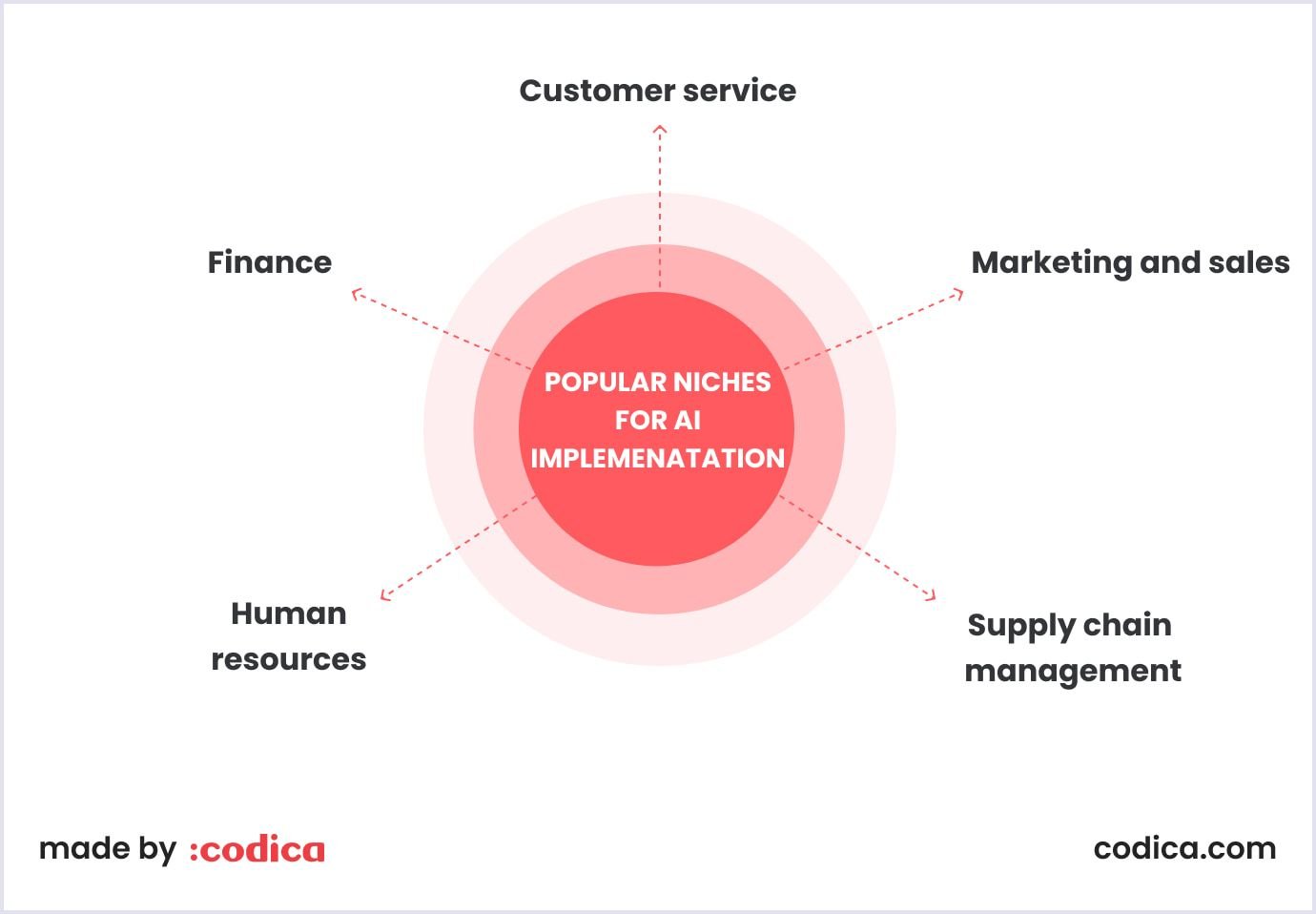
- Customer service. AI-driven chatbots help with a plethora of general tasks, like answering questions, assisting users on how to find goods on the website. Notably, it is available 24/7, covering users’ inquiries without need for human intervention.
- Marketing and sales. Predictive analytics and machine learning algorithms work with tons of data to drive marketing campaigns and develop sales strategies that boost customer engagement and conversion rates.
- Supply chain management. AI optimizes supply chain operations by utilizing a lot of data. In turn, gathered data is used to predict demand for specific items. Also, AI suggests ways for managing inventory, and identifying potential disruptions, thus ensuring smoother and more efficient logistics.
- Human resources. When it comes to recruting talents, AI can simplify this process by analyzing resumes and pinpointing important data for the company. As a result, this process saves a lot of time for recruiters.
- Finance. In finance, AI algorithms enhance security, knowing how to see suspicious activities and transactions. Besides, it also automates financial reporting and provides insights for data-based decisions.
As mentioned, AI implementation has become commonplace in business, regardless of the niche and specialization. The reason for this is the superior benefits it provides. Businesses keep up with AI advancements for several reasons.
Firstly, it provides a competitive advantage. Companies that embrace AI technologies can outperform their competitors. For instance, data-driven insights and highly optimized business operations can greatly help in this matter.
Secondly, AI integration brings efficiency and cost savings. For example, automation and process optimization leads to significant cost savings and operational efficiencies, allowing businesses to allocate resources more effectively.
Lastly, AI business opportunities are all about fresh and innovational approaches. Its integration creates space for businesses to quickly adapt to everchanging rules in the market. After all, this helps them stay relevant and resilient in the market.
10 ways AI can revolutionize your business
AI-driven customer insights
It’s no secret that AI works by analyzing tons of data. If you use it to analyze how users behave and act on your platform, you can get your hands on customer insights which are super helpful in business transformation.
Sources like browsing, social media, and purchase history can provide a lot of info if you know how to leverage it. These, in turn, can be used to improve various processes within your platform to affect and improve metrics and overall success.
Some of the most notable platforms to work with customer insights are Hotjar and Mixplanel. Both of them allow you to access analytics while providing tips and ideas to improve user experience.
Personalized marketing campaigns
Marketing is a powerful thing to attract people. Yet, a personalized approach is even more potent. AI, in this matter, greatly simplifies the process.
Thanks to in-depth customer analysis, AI tools can come up with tips and ideas on how to do marketing tailored to specific user types. Needless to mention that this level of personalization increases the effectiveness of all your marketing efforts. After all, this can result in higher engagement rates, retention boost, and better return on investment.
For example, personalized marketing campaigns have already been implemented in many services.
- Spotify. This audio-streaming platform is praised for its ability to understand tastes and suggest music based on your past listenings. In fact, Spotify uses smart AI algorithms to analyze listening habits and deliver what people expect the most.
- Netflix. Similar to Spotify, Netflix wonderfully reads user interests and suggests movies and TV shows based on previously watched.
- Amazon. This marketplace also leverages AI algorithms but in a different way. Amazon mainly focuses its AI efforts on product recommendations. This way, users regularly see products they most likely need, want, or will purchase in the near future.
AI-enhanced product development
Speaking of software development, AI can do a lot to simplify the process. For starters, it analyzes your business’s performance from a customer perspective, allowing you to see what should be done or improved. This approach creates space for more informed decisions on features, pricing, and markets.
In development itself, AI can help with interface and graphic design. If you’re short on design resources, AI can automate design variations and analyze user preferences to create appealing, accessible designs quickly.

In product management, you can use AI to automate general repetitive tasks as well as analyze data to identify improvements and suggest new features, allowing managers to focus on strategic decisions.
Advanced data security
Securing the data, both internal and your users’ data, is paramount for any business. Yet, doing so without a substantial investment is challenging. AI algorithms, in turn, can detect a wide range of security issues in real-time, allowing for faster and more effective responses.
Machine learning models also continuously learn new types of cyber threats, providing continuous protection against evolving risks. Implementing AI-driven security measures helps businesses safeguard sensitive information and maintain customer trust.
For example, a tool called Cylance focuses on AI-driven cybersecurity. It offers advanced solutions to predict, identify, and neutralize cyber threats. Using machine learning, Cylance provides proactive defense mechanisms that secure digital assets and optimize system performance.
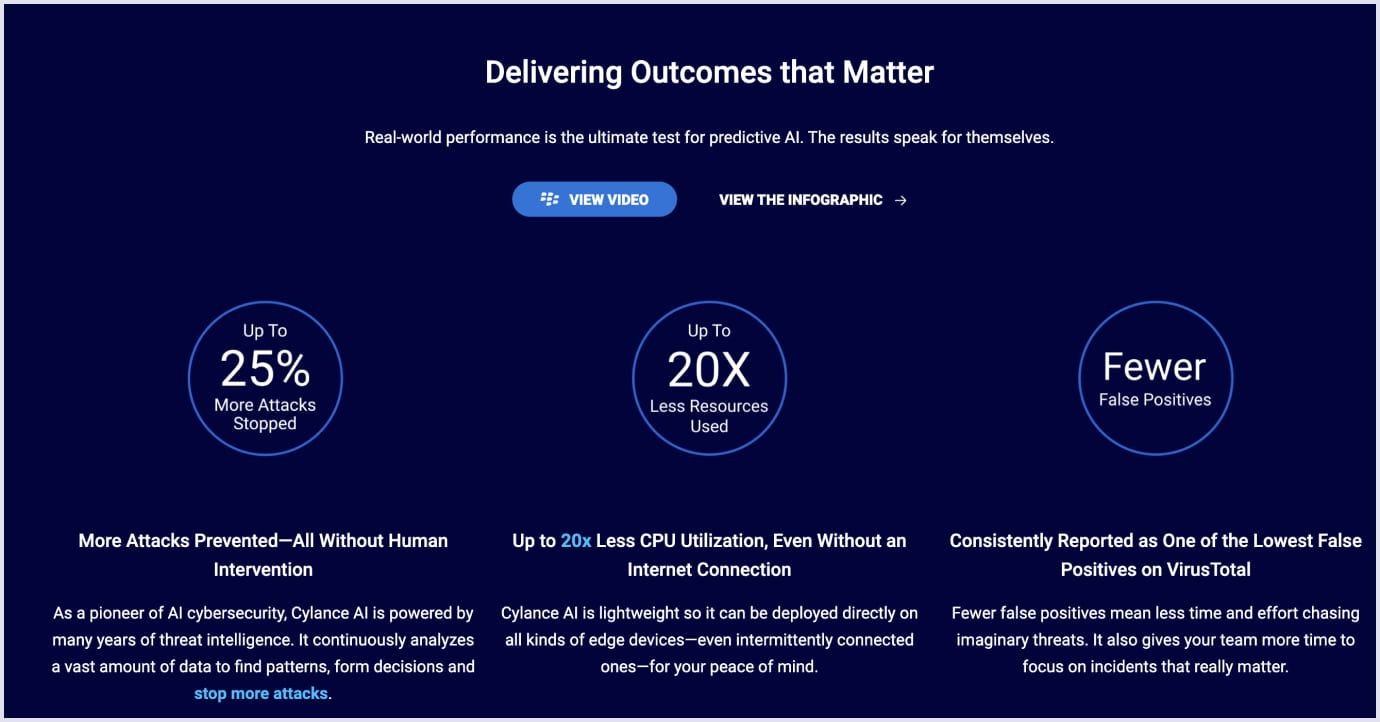
Some of its services include:
- CylancePROTECT. This one is Cylance’s core endpoint protection platform, using AI to detect and neutralize threats before they cause harm. By analyzing files and running predictive models, it blocks both known and unknown malware, reducing reliance on traditional antivirus solutions.
- CylanceOPTICS. It is an AI-driven endpoint detection and response (EDR) tool that works with CylancePROTECT. It provides detailed visualizations of attack lifecycles and enables automated responses to threats, minimizing the risk and impact of security breaches.
- ThreatZERO. It is Cylance’s consulting service that helps businesses achieve strong security postures. Through training and implementation, ThreatZERO experts ensure optimal use of Cylance’s AI-based solutions, enhancing cybersecurity defenses.
- CylanceGUARD. This tool combines AI with expert human oversight for managed detection and response. It offers continuous threat monitoring and immediate incident handling, strengthening an organization’s security measures against new and emerging cyber threats.
Smart supply chain management
In marketplaces and all sorts of ecommerce solutions, supply chain management always takes time and effort to be fine-tuned. For this reason, many companies, from huge corporations to aspiring startups, use AI to optimize this process.
To work with supply chain management efficiently, AI algorithms can improve forecasting accuracy, inventory management, and logistics by providing tips and emphasizing flaws. Generally, AI tools analyze data from various sources you provide, which, in turn, allow it to predict demand for certain products and recommend optimal inventory levels.
After all, implementing AI for smart supply management often leads to reduced stockouts and overstock situations, lower operational costs, and enhanced overall supply chain efficiency.
In this matter, Logility is a solid example of such a tool. As an AI-powered platform, it offers a plethora of functionality for vendor management, supply planning, as well as thorough business planning.
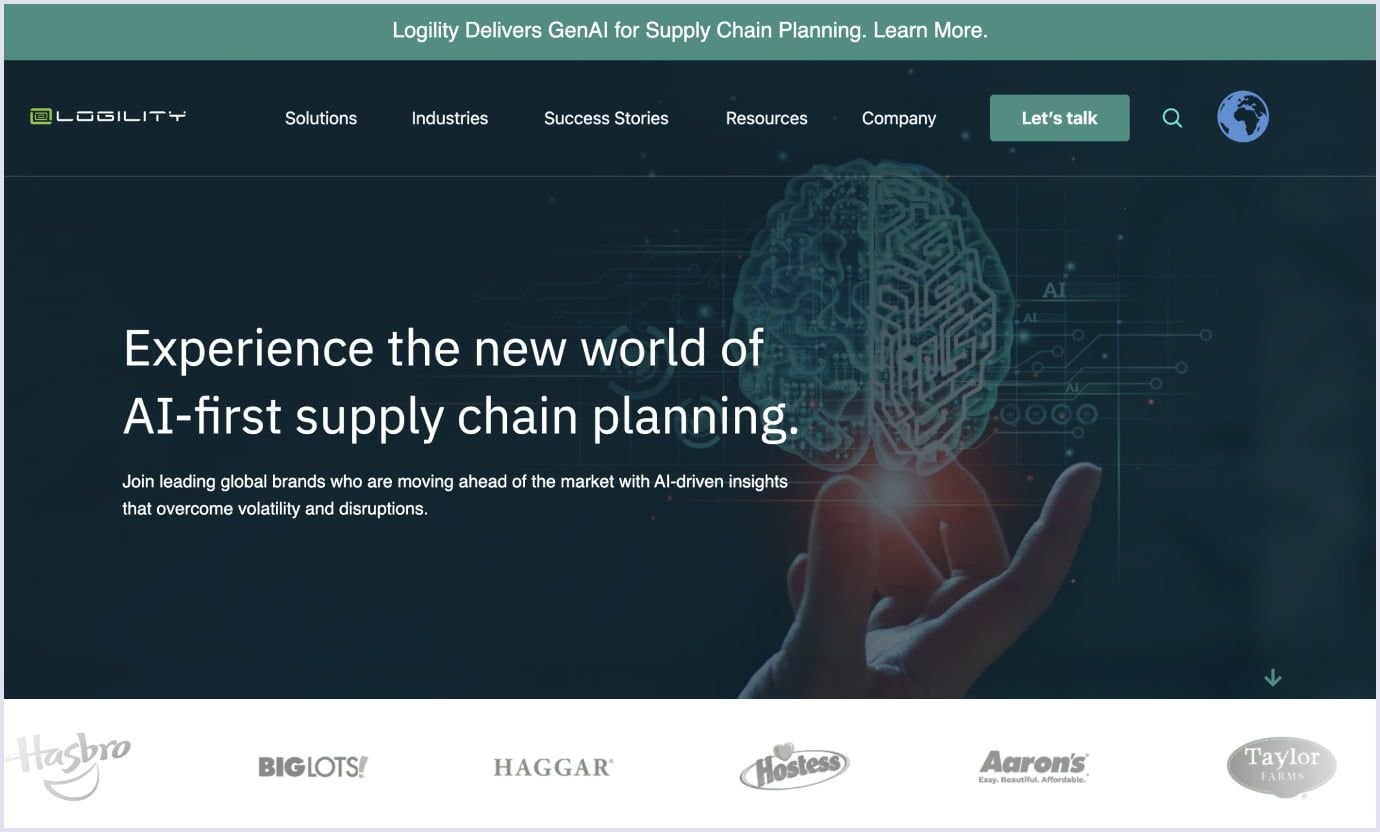
Virtual assistants and chatbots
As AI became more clever and accessible, virtual assistants powered by natural language processing (NLP) models appeared all over the Internet. They changed how customer service operates, providing around-the-clock support and assisting users during their workflow.
Read also: Top 10 Reasons to Add an AI Chatbot to Your SaaS
The major benefit they provide is the economy on workforce. Once AI chatbot or assistant gets integrated, it can easily answer common questions, provide info on customer-specific details, and solve simple issues, saving tons of time for human agents.
One good example of such integration is IBM’s watsonx assistant. Just like many others, it can easily address challenging inquiries. Besides, it supports integration with CRM systems. After all, it has tons of applications in various industries, from the financial to education and healthcare.
AI in human resources
As AI for business transformation becomes more popular, the HR niche remains evergreen and only benefits from the technology growth. This industry has several aspects all of which can be boosted with AI.
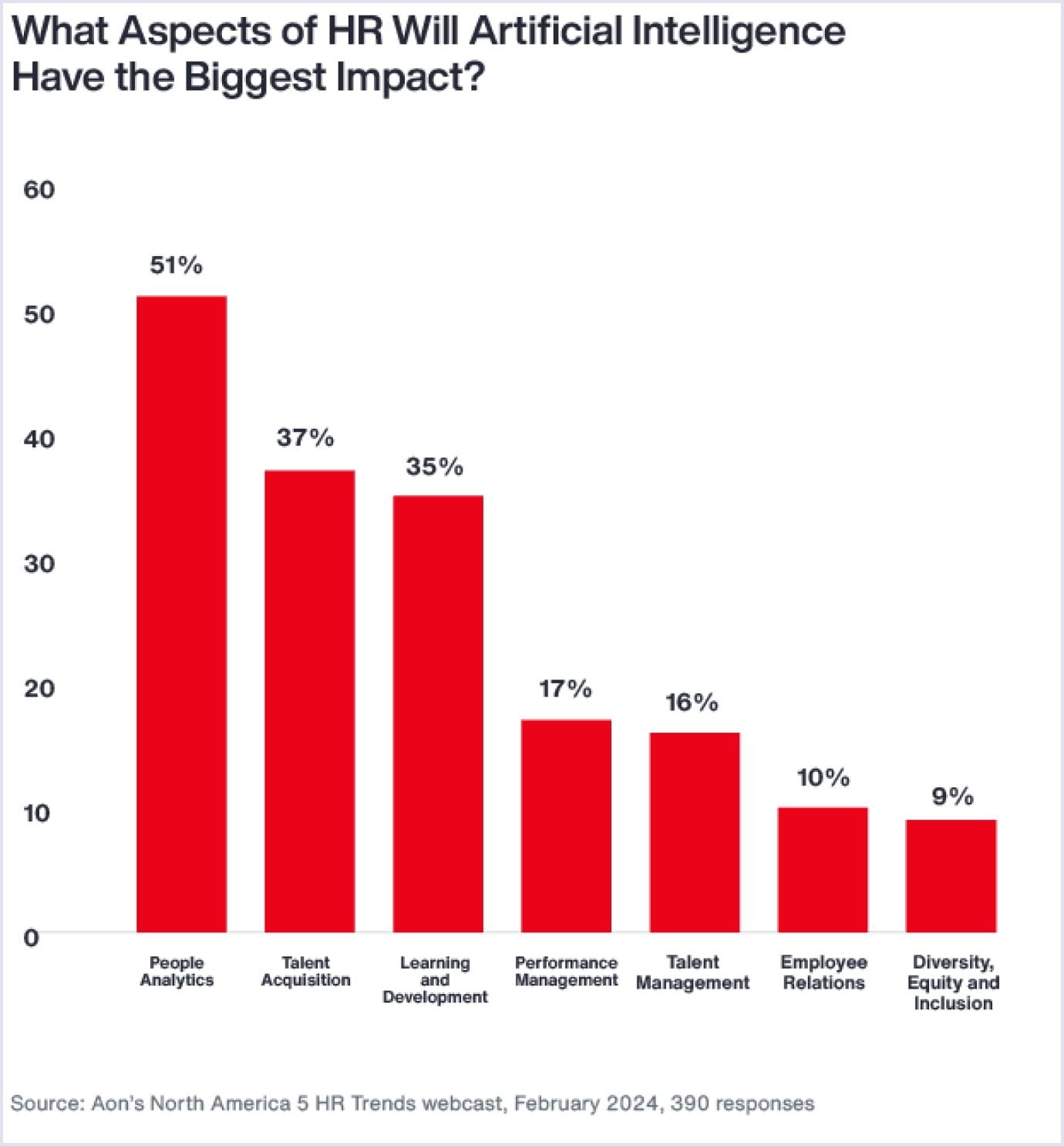
Once integrated, AI can do lots of things, such as streamline the recruitment process, analyze resumes and data. Additionally, AI-driven tools can analyze team’s internal engagement and come up with recommendations for further career growth. This leads to more efficient HR operations, better talent management, and improved employee satisfaction.
Read also: Artificial Intelligence Examples: How Alibaba, Amazon, and Others Use AI
AI in legal and compliance
Attention to detail in the legal and compliance niche is paramount, yet the majority of tasks there take a lot of time. Therefore, AI is a solution to many issues in this industry, offering several use scenarios.
- AI in identifying suspicious activities. AI can significantly help with transaction monitoring by analyzing patterns and anomalies to detect threats like money laundering and fraud. Unlike traditional methods, AI's predictive analysis identifies subtle, complex patterns across transactions, reducing false positives and improving detection rates. Thanks to constant learning, the system always processes new data, regularly improving accuracy and compliance with regulatory standards.
- Streamlining reporting and investigations. AI automates compliance report generation and enhances investigations by quickly analyzing vast data. It automates the creation of reports like Suspicious Activity Reports (SARs) and identifies relevant information for investigations, reducing manual effort and errors.
- Regulatory change management. AI monitors and analyzes regulatory changes in real time, updating compliance databases and flagging changes to compliance officers. This proactive approach ensures institutions quickly adapt to new regulations, mitigating non-compliance risks.
- Legal document analysis and compliance verification. AI reviews contracts, agreements, and policies to ensure compliance with legal standards. It quickly parses documents, flags inconsistencies, and verifies clauses, reducing the manual burden on legal teams. AI's adaptability to different legal frameworks makes it invaluable for global institutions, enhancing accuracy and efficiency in compliance verification.
AI-powered financial analysis
In the financial sector, AI’s role is similar to other restricted and highly controlled industries. in finance enhances personalized services, creates opportunities, manages risk and fraud, ensures transparency and compliance, and automates operations to reduce costs. Therefore, here are several use cases:
- Anomaly detection. Detects anomalies such as fraudulent transactions, spoofing, and cyber threats.
- Recommendations. Delivers personalized financial product recommendations based on customer data.
- Translation. Provides multilingual content and apps to enhance customer interactions globally.
- Document processing. Extracts and analyzes data from documents for processes like loan servicing and investment discovery.
- Image recognition. Analyzes images and videos for insurance claims processing and identity verification.
- Conversations. Enhances customer service with AI-powered interactions in contact centers and personal finance tools.
- Predictive modeling. Predicts outcomes for fraud detection, risk reduction, and customer needs forecasting.

Speaking of examples, FinanceGPT is a noteworthy tool that comprises generative AI capabilities with charts, graphs, and other types of financial data to deliver thoughtful analysis and help you with decision-making.
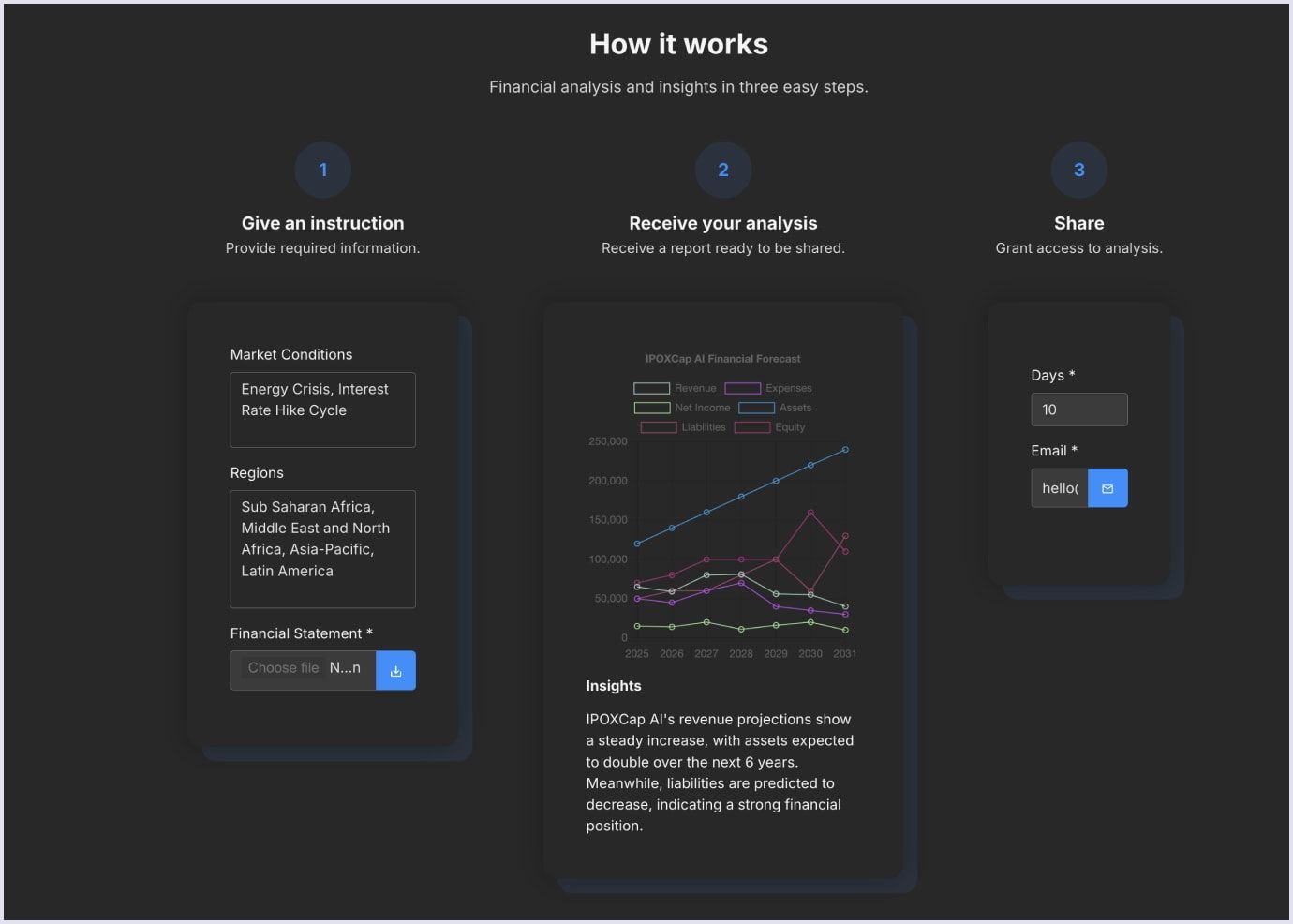
Realize your business ideas with product discovery
At Codica, we offer full-cycle software development focusing on various industries and software solutions. Just like the development itself, all custom software development services we provide are handily divided into categories so that you can either choose one that suits your needs or opt for several.
When it comes to realizing business ideas using AI, the product discovery services we provide are irreplaceable.
Being the first step in custom software development, it is all about complex research and analysis of your idea to create a solution that can perform, sell, and engage. Such early research approach we practice yields many benefits.
Namely, with product discovery services, you can significantly minimize risks associated with creating a business as we outline all potential roadblocks and find openings in the market for your business to occupy.
Proper preliminary research leads to cost savings. Our experts identify the most efficient ways to meet your future users’ needs, eliminating unnecessary features to keep development costs low.
Bottom line
The fast and regular appearance of new technologies forces businesses to transform and adapt to the market. As you can see, both small startups and top-notch corporations equally apply new tools and features to their existing processes, yielding tons of benefits they provide.
Therefore, implementing AI isn’t worth the risk anymore. Instead, it is becoming a necessity many businesses should accept and move on with. Hence, feel free to contact us if you’re looking to implement AI functionality into your solution.
